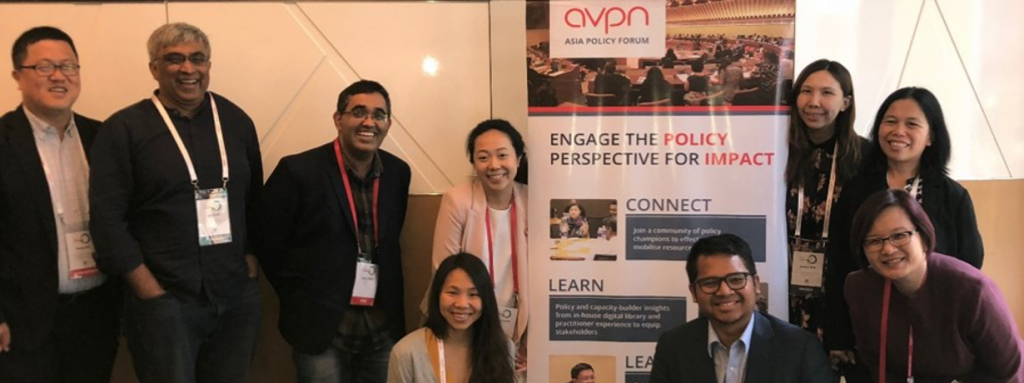AVPN Policy team with part of the 2019-20 Policy Fellows cohort (Young Kim (Association of Korean Local Governments for Social Economy and Solidarity), Raj Gilda (Lend A Hand India), Hsiao-Wei Wang (in place of Ray Chen; B Current Impact Investments Inc), Ridwansyah Yusuf Achmad (West Java Governor Office), Jessica Tam (Social Enterprise Business Centre – Hong Kong Council of Social Services) and Melanie Moleno (Board of Investments, Department of Trade and Industry).
5 min read
The 2019-20 cohort of policy fellows from the Policy Leadership Lab were inducted at the AVPN Conference, marking the start of a 12-month journey of working with AVPN members and resources to advance policy initiatives in their respective markets.
Why are networks important for policy initiatives?
Rigid and unimaginative bureaucratic structures, siloed and separate streams of competing priorities, lack of accessible and transparent data, the need to toe the line around legal definitions and red tape when working with non-traditional allies. These, and more, have been touted as critical challenges in working with the government to advance scalable and proven solutions. The good news is that policymakers at various levels of government are keen to engage differently with social investors, as evidenced by the commitment of the 2nd cohort of AVPN’s Policy Leadership Lab fellows. Their proactiveness bodes well for the possibility of collaborative ways for policy and social investment to work together.
The not-so-good news is that despite their best intentions, policymakers that want to engage more deeply with social investors face challenges of their own. They are juggling many different policy priorities typically with little bandwidth to mobilise resources and appropriate authority’s attention to engaging social investors, especially when they could be in remote locations with little time or budget to spare for travel. Some fall short of the needed knowledge and capacity to fully explore the possibilities that social investors can offer, or are limited to out-of-date or traditional resources, with little opportunity for an authentic dialogue across geographies, sectors and designations on shared challenges and winning formulas. Others feel challenged to think creatively about how policy and social investment can partner, with no precedent frameworks or mapping to guide how, where and from whom can impact capital be provided and utilised. Yet, when time and resources are invested to engage deeply in AVPN, as a platform that creates high-fidelity convening of important stakeholders across sectors, the power of networks can truly come alive.
Amidst the dizzying excitement of the 4-day AVPN Conference, the 2019-20 cohort of Fellows were inducted into the second iteration of the Policy Leadership Lab on the second day of the flagship event. As a high-touch engagement programme over 12 months, the Lab aims to help the Fellows overcome the challenges cited above and engage social investment resources to advance their policy initiatives. The newly inducted Fellows were invited to collectively reflect on what the Policy Leadership Lab will mean for their work, and how social investment resources provided by the AVPN platform can be used to drive them closer to meeting their objectives.
Here are four ways the 2019-20 cohort of Fellows plans to engage the power of AVPN’s network of members and stakeholders, through the Policy Leadership Lab:
Learning from failures together
Acknowledging failure is the first step. Gracefully accepting and considering the factors that may have led to why an initiative failed, is the next. Lastly, it is a tangible way forward to examine failure collectively with a group of peers who are aiming to create the same social change as you.
Surfacing best practices in forging resilient government partnerships
Some Fellows alluded the experiences of working with government to a chain reaction – when one government or agency starts to work collaboratively, the rest follows. Others professed to being in a constant state of trial and error, learning about what works and what doesn’t on the fly. Existing and alumni Fellows are well-versed with complex political systems and bring with them deeply varied experiences of collaborating with and within government. Acknowledging the inherent differences while sharing the lessons embedded within these experiences can be important in course-correcting and exploring the feasibility of government-social investment collaboration to drive forward a policy initiative.
Leveraging areas of synergy within and outside the Fellowship
Critical needs of today related to climate change, the ageing population, and underprepared, undereducated workforce are prevalent in markets across Asia. With no one-size-fits-all formula for working with the government, building capacity through identifying areas of synergy with peers who possess the technical expertise one lacks, is a way for policymakers to harness the knowledge and resources to tackle complex problems.
Taking ownership: You are part of the AVPN network
In the words of Lend A Hand India fellow, Raj Gilda, “the network is what you make of it”. In other words, policy Fellows can benefit best when they also invest the time and resources to engage with what the Lab can provide. With 550+ AVPN members whose work spans different social causes and geographies, each member can be a provider of human, financial or intellectual capital, a future partner to policy work, or an expert in an area of knowledge that is lacking.
So how can AVPN Members engage in the Policy Leadership Lab?
- Nominate or sponsor a policy champion you know who is ready to take the lead in cross-sector collaborations to be a Fellow. Contact [email protected] for nominations and sponsorship queries.
- View collaboration opportunities available on APFx or list a policy initiative that is ready to engage cross-sector resources.
- If you would like to stay updated on what the newest virtual consultations will be about, complete this Google Form to receive future updates.
- Want to meet the Fellows? Reach out to [email protected] so we can connect you accordingly.
ABOUT THE AVPN POLICY LEADERSHIP LAB
Now in its second year, the AVPN Policy Leadership Lab aims to engage both policymakers and AVPN members to engage social investment resources to advance different policy initiatives. Policymakers or partners are inducted as Fellows in the Lab. For 12 months, AVPN co-curates a series of consultations with the Fellows, inviting select AVPN members to discuss areas of challenges and to provide inputs needed for the policy initiative to advance. When opportune, the Lab will leverage signature AVPN events or local member convenings as opportunities for Fellows to facilitate an in-person physical consultation with members.
View more information about the Policy Leadership Lab here.


















